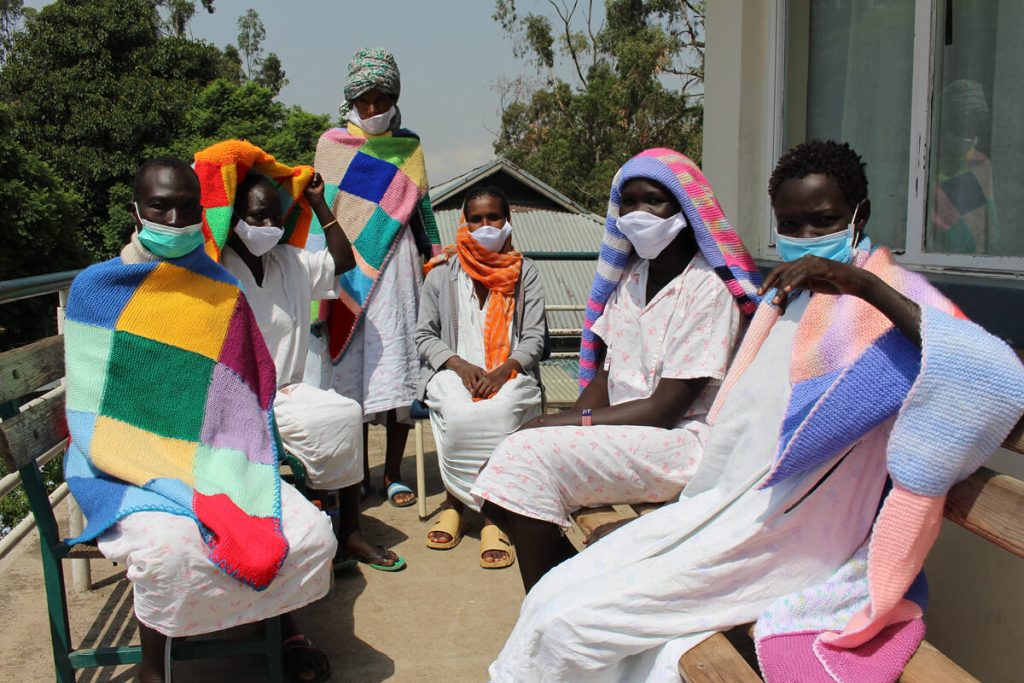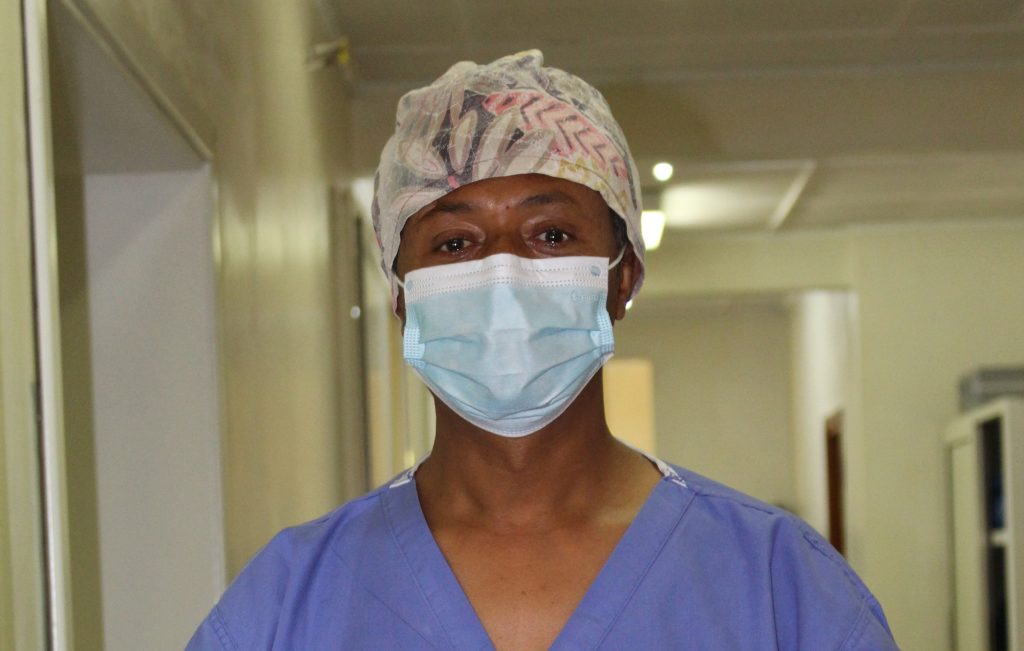Since the World Health Organization (WHO) declared COVID-19 a pandemic, the world has seen an unprecedented strain on health care systems. As we progress through the pandemic, Hamlin Fistula Ethiopia is working harder than ever to progress in our fight to end obstetric fistula, forever. Last year, we closely considered COVID-19’s impact on maternal health care in Ethiopia. One year on, what has happened since then?
The COVID-19 context in Ethiopia
From 3rd January 2020 to 28th April 2021, there were a total of 255,288 confirmed cases of COVID-19 in Ethiopia, with 3,639 deaths reported to WHO (1). Recently, there has been an increase of COVID-19 cases in Ethiopia via community transmission (2).
COVID-19 is still impacting women and maternal health services. According to a United Nations assessment on the socio-economic impact of COVID-19 in Ethiopia, “Women are at the center of any disease outbreak - and outbreaks affect women and men differently. Health emergencies disproportionately affect women and girls” (3). Due to the reallocation of resources to prioritize the COVID-19 response, maternal health services have been disrupted, increasing the risk of maternal injury and death. Where a woman lacks access to appropriate maternal health care, the likelihood of her suffering an obstructed labor, and consequently, a fistula injury, drastically increases. That’s why Dr Catherine Hamlin believed that every woman should have access to a midwife.

During the pandemic, many nations have observed a deterioration in the mental health of pregnant women. Two studies conducted in Turkey stated that the level of anxiety pregnant women felt had increased due to the pandemic (4, 5). In the West Shoa zone of Ethiopia, there has been an observable decrease in the use of maternal health services, as a corollary on the pandemic. The factors of geographic isolation, lack of maternal health education and cost of travel are continuing barriers to visiting maternity clinics. In addition to these factors, the fear of contracting coronavirus and restrictions on movement during lockdowns, has led to a further decrease in pregnant women seeking appropriate medical care (6). A study conducted in public health institutions in Dessie Town, north-east Ethiopia, demonstrated a decrease in the number of women using maternal health services due to fear of traveling to the health care providers during a pandemic (7).

Meeting maternal health needs in a pandemic
COVID-19 led to a reduction in patients seeking treatment at Hamlin’s fistula hospitals from May to August 2020, as people became fearful of going to hospitals. However, Hamlin’s Addis Ababa Fistula Hospital and over 50 Hamlin-supported midwifery clinics remained open during the pandemic with safeguards in place to prevent the spread of COVID-19. In October patient flow increased and the number of patients returned to normal operation at five Hamlin fistula hospitals, with Hamlin’s Mekele Fistula Hospital closed at the time for renovations.
In November and December 2020, 276 procedures were undertaken at Hamlin fistula hospitals. Results thus far in 2021 have been very encouraging. All six Hamlin fistula hospitals are now open, with 572 outpatients treated in February alone. In January and February 2021, 326 women underwent surgery at a Hamlin fistula hospital. These positive outcomes are attributable to the continuing determination of Hamlin’s Clinical Team to eradicate obstetric fistula.

Through famine, war and now a pandemic, Hamlin has provided fistula surgery and treatment, free of charge, for over 60 years. Hamlin’s staff of over 550 Ethiopians continue to provide best-practice care based on the precepts of the Hamlin Model of Care. When a woman arrives at a Hamlin hospital, she is embraced with love and care. She is given nutritious food, a handmade blanket and clean clothing. A customized program is developed for every patient which includes fistula repair surgery, physiotherapy, numeracy and literacy classes, and counseling.

Economic consequences for women during the pandemic
COVID-19 has severely impacted people’s livelihoods in Ethiopia. Women are particularly affected since they are more likely to be engaged in informal or low-wage employment (3).
According to the World Bank, “Women’s economic outcomes—such as employment and income—have consistently been far worse than those of their male counterparts” in Ethiopia. The pandemic has only exacerbated this gap. Although worker layoffs were limited in scale, female employees were affected the most. Layoffs have tapered off in recent months, yet women are still disproportionally affected. Furthermore, studies show alarming signs of a widening gender gap in the business opportunities of women resulting from the pandemic (8).

Empowering women leads to thriving economies. UN Women posits that “women’s economic empowerment boosts productivity, increases economic diversification and income equality in addition to other positive development outcomes” (9). It is more important than ever we support Hamlin patients in this economic situation by continuing to provide literacy and numeracy classes and vocational training.
This training gives women a platform to regain their independence when they return to their communities. Hamlin’s Rehabilitation and Reintegration Center, Desta Mender, continues to restore the health and dignity of women who have sustained severe or complex fistula injuries. During their stay, they receive physical and emotional rehabilitation while accessing ongoing medical care for their injuries. Hamlin has helped facilitate government grants for patients to start their own business. To date, Hamlin has helped approximately 50 former fistula patients with start-up .
Continuing to empower young women during a pandemic
Throughout the pandemic, the Hamlin College of Midwives continues to be a center of excellence for training midwives. The Hamlin College of Midwives was temporarily closed in March 2020, with students sent back to their hometowns to study remotely. Each cohort had a designated adviser supporting them via phone, email and online learning groups. Students also visited nearby government clinics for practical observations. Despite the myriad challenges of studying remotely, the class of 2020 all graduated with a Bachelor of Science in Midwifery. Since 2010, 195 Hamlin Midwives have graduated and been deployed to rural areas.
Hamlin Midwives have played an important role in raise awareness about COVID-19 and preventing community transmission. This is because Hamlin Midwives have gained the trust of their communities through years of excellent clinical work, community engagement and their ability to speak different regional languages in Ethiopia. Today, there are over 50 Hamlin-supported midwifery clinics across Ethiopia.

COVID-19 has presented significant challenges to the provision of maternal health care in Ethiopia. Nevertheless, existing health care networks have proved flexible in meeting the maternal health needs of Ethiopian women. The team at Hamlin remains committed to eradicating fistula. Forever.
References
- World Health Organization: Ethiopia WHO COVID-19 Dashboard.
- World Health Organization: WHO COVID-19 Dashboard.
- United Nations Ethiopia: UN Socio-Economic Impact Assessment of COVID-19 in Ethiopia. Chapter 5: People most at risk.
- University of Health Sciences, Turkey: Anxiety Levels and Obsessive Compulsion Symptoms of Pregnant Women During the COVID-19 Pandemic.
- Istanbul Medeniyet University: Anxiety and Post-Traumatic Stress Disorder Symptoms in Pregnant Women During the COVID-19 Pandemic's Delay Phase.
- Ambo University, Ethiopia: Maternal Health Care Services Utilization Amidst COVID-19 Pandemic in West Shoa Zone, Central Ethiopia.
- Wollo University, Ethiopia: The Impact of COVID-19 Infection on Maternal and Reproductive Health Care Services in Governmental Health Institutions of Dessie Town, North-East Ethiopia, 2020 G.C.
- World Bank: Assessing Ethiopian Women’s Vulnerability to the COVID-19 Pandemic.
- UN Women: Facts and Figures: Economic Empowerment.
Written by Celia Li, intern at Catherine Hamlin Fistula Foundation